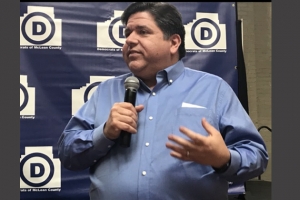
By Illinois Radio Network
SPRINGFIELD – Illinois Gov. J.B. Pritzker has signed legislation paving the way for local municipalities to contract with private firms to audit local businesses and state sales tax figures in hopes they’ll find a mistake.
The practice is already happening, with the largest firm, Azavar Government Solutions, active on behalf of a number of communities.
The firm, upon taking up a contract with a community, will audit the sales information from a city’s businesses. They then compare that with the remitted funds from the Illinois Department of Revenue, which acts as the tax collector for Illinois’ municipal governments. They will call out the mistake and take a portion of the recovered revenue as payment.
“This is, essentially, a best-practices bill,” said state Rep. Michael Zalewski, the Riverside Democrat who sponsored the final version of the legislation. “There are safeguards in place for the villages, the Department of Revenue, and the stakeholders.”
The measure, which had also been introduced in 2017 but failed to pass, stemmed from the need to help local governments reeling from lower state government distributions and budget uncertainty at the state level, Zalewski said.
Critics of the process point to privacy issues with a business’ sensitive sales tax data and the contingency fee taken by Azavar and others when they do recover sales tax revenue.
“From what we’ve seen, the standard is from thirty to forty percent,” said Carol Portman, president of the Taxpayers’ Federation of Illinois.
Portman said the extra sales tax revenue often comes from other towns nearby that the Illinois Department of Revenue had erroneously given the revenue to.
“Town A’s going to have to give that money back and Town B will get 70 percent of it or 60 percent of it or 50 percent of it,” she said.
City of Freeport officials terminated their contract with Azavar in 2018 over a dispute about contingency, according to a report from the Journal-Standard.
Azavar also came under fire last April for soliciting the private sales tax data of businesses from cities and contacting the state on behalf of municipalities, both forbidden at the time.
Officials from Azavar wouldn’t respond to questions about how much of their found revenue comes from other communities wrongly receiving sales tax revenue, nor would they disclose their commission and fee structure they charge municipalities.






